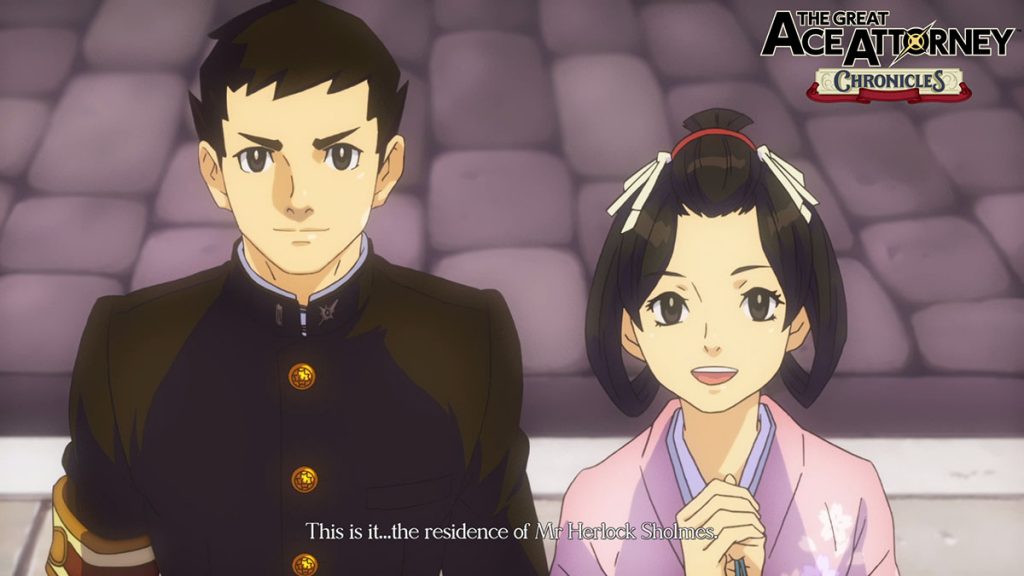
A Most Miraculous English Dub
Jul 13, 2021 // Janet Hsu
Hello, again! I’m Janet Hsu, Localization Director of The Great Ace Attorney Chronicles. Continuing from my last installment on localization, I thought I’d share a bit about the English dub and how we went about doing it in the middle of the pandemic.
From the beginning of the project, I’d had a few ideas in mind about what I wanted to do. I knew I wanted to use a UK studio, and that I wanted to cast actors with similar backgrounds to the characters in the game. As you can probably already guess, this is related to my want to make this title as authentic as possible.
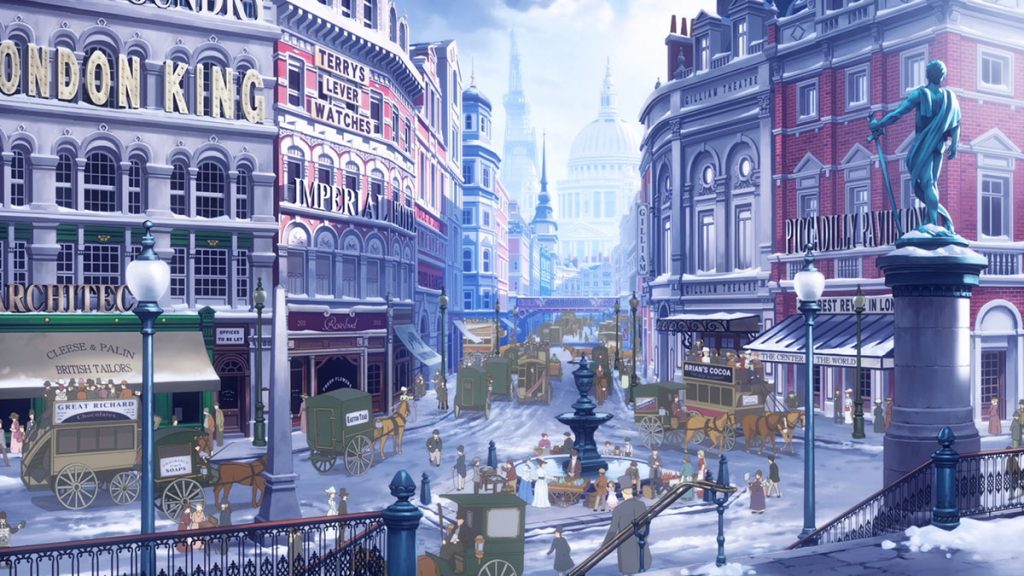
It may seem strange, but up until the last couple of years, English game voice dubbing was primarily done in the US, specifically Los Angeles. But with the London setting being such a core element to the story this time, I wanted to be able to aurally paint with the entire pallet of accents that we were already using in the in-game text. This is not to say that there aren’t talented actors all over the world who can’t put on a mean British accent or two, but for the variety of accents and characters we were going to be portraying, I figured the largest pool of talent was going to be in the UK.
But, before we could pick out an exact studio, the pandemic struck, and the dev team and I were left wondering if we were even going to be able to record an English dub. One day, back when Japan was still relatively unaffected, the team leaders and I sat down to talk about what to do. Given how the pandemic was playing out and how severe the lockdowns were, we even floated the idea of using the Japanese dub and simply re-dubbing the necessary lines to Herlock Sholmes – it really was a situation in which no one had enough information about anything. We didn’t know how many actors had home studios or some other sort of recording environment capable of doing remote recordings, and we didn’t know what kind of contingencies the sound studios themselves would have – there were so many industry firsts to figure out. But in the end, it was thanks to the hard work and cooperation of our recording partner, SIDE UK, that made this high-quality English dub possible. To this day, I am thankful beyond words for all they did.
Our studio picked, we set about casting our voice actors. When SIDE asked if we had any preferences in casting, I wanted to answer that I wished to cast people of Japanese descent for all of the Japanese characters. But in the middle of the pandemic, it was highly possible that we wouldn’t be able to record in studio, which would’ve greatly reduced the pool of actors from which we could choose. Still, it was important to me that we had actors of Japanese descent to play our main characters, so I had to strike a balance and take the more realistic route by asking for Ryunosuke and Susato as ‘musts’ while the other characters would be ‘optional’.
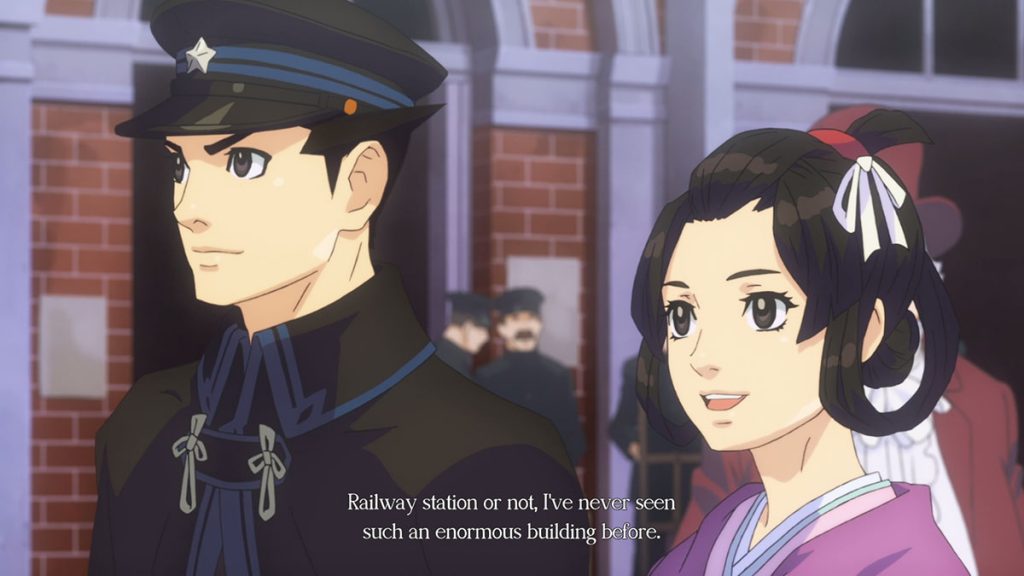
Obviously, the reason why I wanted actors of Japanese descent was for authenticity as well. Aside from scenario considerations, I definitely didn’t want to make anyone put on an accent they didn’t feel comfortable doing, and I didn’t want to use some stereotypical, fake accent either. I also felt that whoever we cast would know what was best for their characters, so I trusted them to give the characters the appropriate accents for their backgrounds – something I’d only feel comfortable with if the actors were of that culture and/or life experience. For example, in the case of Ryunosuke and Asogi, they’re both studying English at university, so through exposure and practice, their pronunciation would be much closer to a British national’s, I imagined. Meanwhile, Susato mainly studied English at home by herself through essays and books (and ‘The Adventures of Herlock Sholmes’, of course!), so perhaps she didn’t have the chance to refine her accent to the same level as Ryunosuke. On that front, both Mark Ota (Ryunosuke) and Rina Takasaki (Susato)’s thinking aligned with mine, and I thank them for bringing that bit of themselves into their roles so beautifully.
I know for some people it might have seemed strange for the characters to have different accents, or to even hear Japanese characters speak with British accents, but I actually really like the fact that everyone is just a little different. As in real life, everyone has different talents and skills, and some people are better than others at speaking in another language with little or no accent, so it’s nice to have that kind of diversity being represented, I feel.
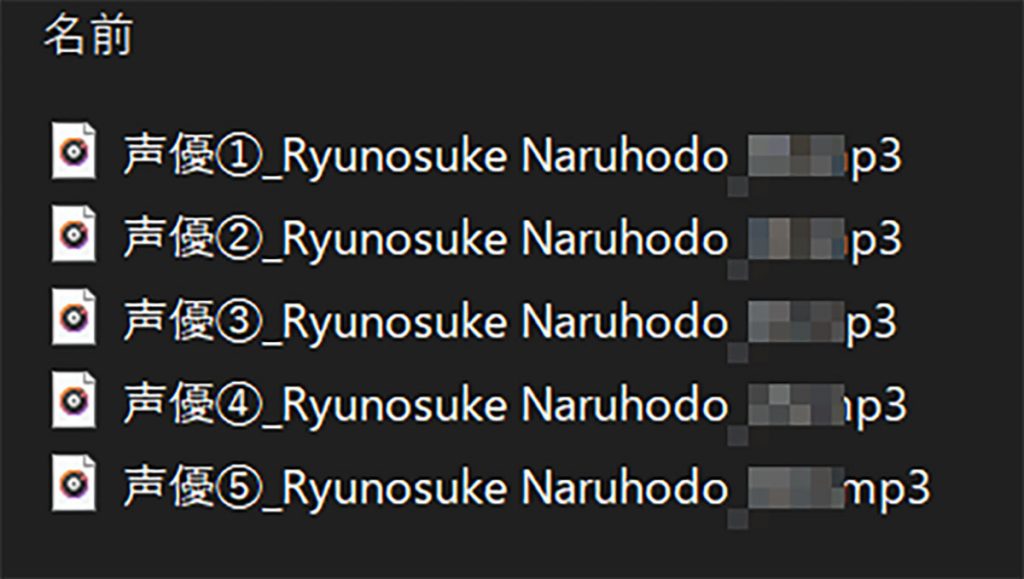
Going back to the casting process, we received around 4 – 5 demo reels per character from the casting directors and conducted a blind audition in which we didn’t know who the voice actors were. A few of us on the team listened to each and every reel, trying to figure out who we though sounded the most like Ryunosuke, or Iris, or Juror No. 3. Then, we compared notes and came up with our final list of top 2 picks per character like this:
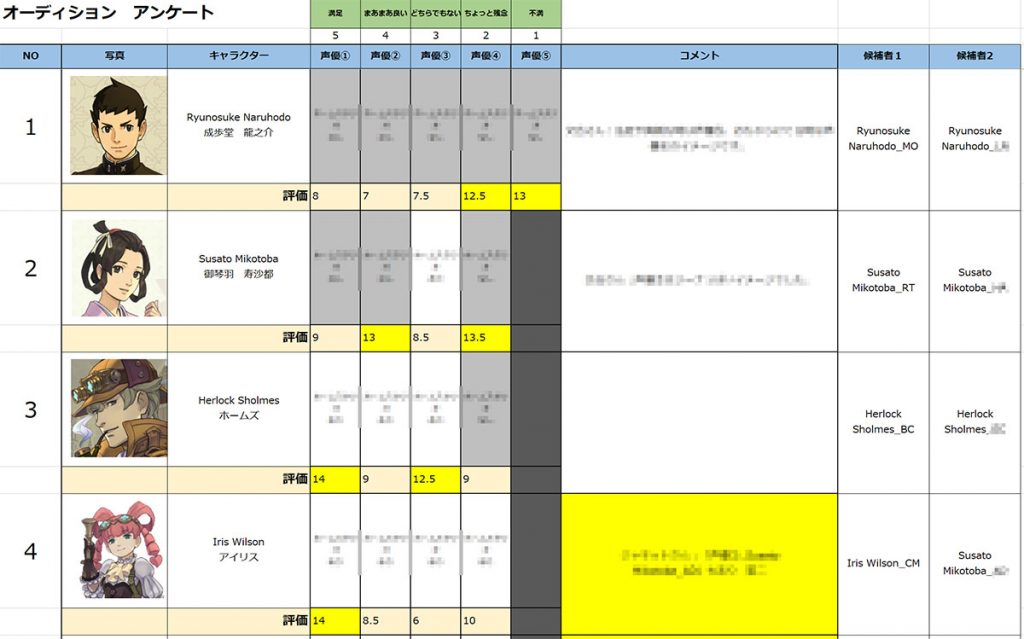
And then, the first day of recording came. It really was a miracle that we were able to record in studio during that brief window when the UK’s countrywide lockdown had been lifted. Unfortunately, the sound director and I couldn’t go out to the studio ourselves as we normally would, which wasn’t ideal; it’s tough to make out small details and inflections in an actor’s read and listen for things like pops over the internet sometimes due to internet lag or network traffic. But with the studio’s help, we were at least able to attend the recording sessions remotely, which is a lot more than nothing. And, thanks to the time difference, we’d start recording at 5 p.m. Japan time, and wrap up at a mostly reasonable hour…if you count the occasional 2 a.m. wrap up “reasonable”, lol. (It would’ve been a lot worse had it been L.A., that’s for sure!)
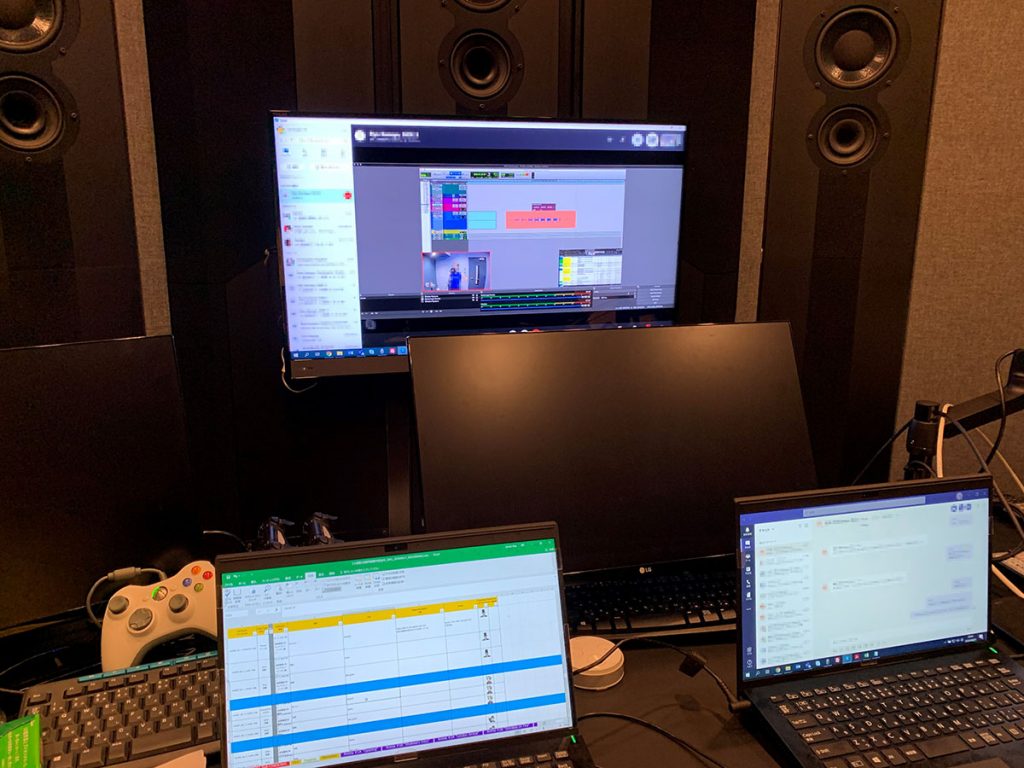
During the recording, the sound director, one of our sound managers, and I were in one of Capcom’s mixing studios. There, the three of us sat like a team of ninjas with our black-colored face masks stuck firmly to our faces, while another of our sound managers was forced to sit all alone at his desk (everyone else had already gone home for the day) and join us virtually from a few floors up in the interest of social distancing. (Sorry, Kanaya-san! ><; )
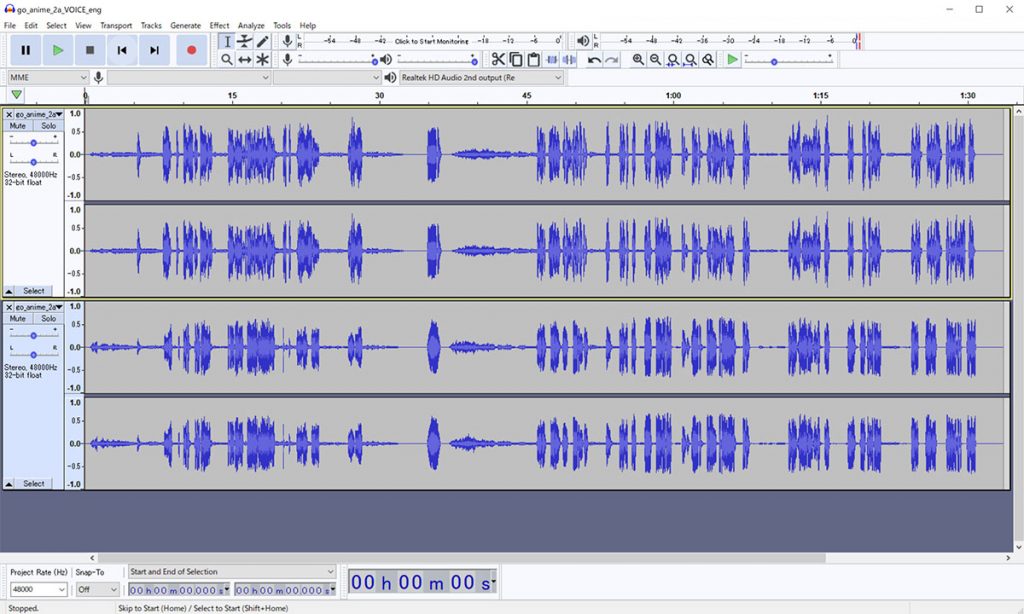
The top is the English, and the bottom is the Japanese.
To make the best of our studio time, the translators, the dev team, and I prepared a number of things in advance. The first of these was the recording script. The translators really outdid themselves by taking such care when writing it that most of the lines matched the Japanese length perfectly, and I barely had to do any on-the-spot rewrites. This helped a lot in the mouth flaps department and with real-time cutscenes where the length of each cut was pre-determined for the English dub, and kept the recording session rolling smoothly. The other thing we prepared were detailed background profiles for each character and other reference materials. Having all that information in advance helped the actors and the voice director to become familiar with the game and the characters they were to play, so we could hit the ground running the day of the recording. And with our voice director’s incredibly sharp and empathetic directions, our actors were able to give some incredible performances, despite the great time constraints that come with dubbing to another language track’s length. As you can see from the waveforms above, the two line up so insanely well that I shed a tear every time I look at it. But then, I expected nothing less from such talented professionals!
And that, as they say, is that…right? Well, not quite. As you can hear from this clip, even after we’d finished recording, there was still work to be done. Because I had only heard the acting through the internet, I first went through all the recordings and double checked all of the OK takes and selected new ones if I liked another read better. After finalizing my choices, the sound director adjusted the volume of each line and added in effects like reverb or other sound effects to complete the scenes. He then had to implement these files into the game like any other game asset. Lastly, my scripting buddy Chester and I had to adjust the timing of the subtitles so they’d display when they should. Looking back, it really makes you appreciate just how much work and how many people it takes to produce just one new language track for a game. To everyone from our partners at SIDE UK and the voice actors, to my fellow dev team members – from the bottom of my heart…
Thank you for everything!
And now we’ve come to the end of this miraculous tale. I’m really glad I had the chance to share just a sliver of what went into the localization of The Great Ace Attorney Chronicles. I’ll be back for one more blog in the future, but for now, the main composer, Mr. Kitagawa, will be here next time to talk about how he composed the wonderful music of The Great Ace Attorney Chronicles. It’s sure to be full of fascination insights, so you won’t want to miss it!
Until then!
-
Brands: Ace Attorney
-
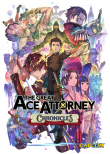
Loading...
Platforms:
